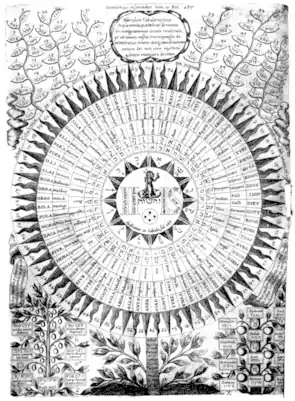Shemhamphorash
Shemhamphorash (alternativamente Shem ha-Mephorash o Schemhamphoras, hebreo: שם המפורש) originalmente es un término tanaítico[1] que describe el nombre oculto de Dios en la Cábala (incluyendo las variantes cristianas y herméticas), y en algunos discursos judíos más convencionales. Está compuesto por cualquiera de 4, 12, 22, 42, o 72 letras (o tríadas de letras), la última versión es la más común.[2][3][4][5][6][7][8]

Un «diagrama cristiano» de los 72 nombres de Dios en la obra de Athanasius Kircher Oedipus Aegyptíacus (1652-1654). El estilo y forma son típicos de la tradición mística, ya que los teólogos antiguos comenzaron a fusionar conceptos de clasificación y organización previos a la ilustración con la religión y alquimia, tal vez para darle forma artística y una visión más conceptual de Dios. IHS es un monograma del nombre de Jesucristo.
Referencias
- «Jewish Encyclopedia, Shem Ha-Meforash». Jewishencyclopedia.com. Consultado el 22 de julio de 2013.
- Arguing with Angels: Enochian Magic and Modern Occulture, by Egil Asprem, SUNY Press, 2 Apr 2012, p.33
- The Black Arts, by Richard Cavendish, Penguin Group, p.119
- Encyclopedia of Occultism and Parapsychology (Fifth edition), "Shemhamphorash", ed. J. Gordon Melton, Gale Group, p. 1399
- Jewish Magic and Superstition, by Joshua Trachtenberg, Behrman's Jewish Book House, 1939; hosted at The Internet Sacred Text Archive, 2008; p.90-98 and notes for the section on p.288 and onward
- Magic, Mystery, and Science: The Occult in Western Civilization, by Dan Burton and David Grandy, Indiana University Press, 2004, p.69
- Sepher Raziel Hemelach: The Book of the Angel Raziel, trans. Steve Savedow, Weiser Books, p.18
- The Goetia of Dr Rudd, by Thomas Rudd, Ed. Stephen Skinner & David Rankine, 2007, Golden Hoard Press. p.14, 39-44, 67-73
Este artículo ha sido escrito por Wikipedia. El texto está disponible bajo la licencia Creative Commons - Atribución - CompartirIgual. Pueden aplicarse cláusulas adicionales a los archivos multimedia.